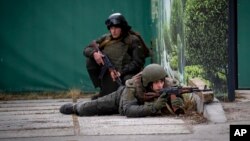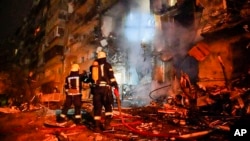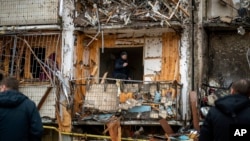Russian forces advancing on Kyiv and other key cities as part of a plan to “decapitate” Ukraine’s government appear to have lost some momentum, U.S. and Western officials warned Friday, as they and Moscow ramped up information operations to keep up with fighting on the ground.
Explosions and gunfire continued to rock parts of the Ukrainian capital Friday, along with areas near Kharkhiv in the north and Kherson in the south, as Russian forces continued a slow march farther into Ukraine.
A senior U.S. defense official, briefing reporters on the condition of anonymity in order to discuss intelligence, said the Russian assault had unleashed a barrage of more than 200 ballistic and cruise missiles since the invasion began, most of them targeting the Ukrainian military.
But the official said intelligence indicated the operation was not going as smoothly as Russian commanders had hoped.
"The Russians have lost a little bit of their momentum,” the official said. "They are not advancing as far or as fast as we believe they expected they would."
The Russian advance on Kyiv, in particular, seems to have gotten bogged down.
“They're meeting more resistance than they expected,” the U.S. official said, adding that Russian forces had yet to establish air superiority despite a numerical advantage and efforts to eliminate Ukrainian air defenses.
Ukraine’s command and control “is intact,” the official, added.
In Kyiv, Ukrainian President Volodymyr Zelenskyy sought to rally his nation, rejecting rumors that he had fled the city, and insisting he and other government officials “are all here, defending our independence, our state.”
Russian claims
Russian officials countered Friday that their forces had made solid progress in what they described as an effort to eliminate a terrorist threat.
In one social media post, Russian Major General Igor Konashenkov said his country's forces had disabled more than 200 Ukrainian military facilities and dozens of air defense batteries and radar stations, while destroying a handful of Ukrainian combat planes, helicopters and military vehicles.
Russia’s military also said Friday that it had taken control of the strategic Hostomel airport northwest of Kyiv.
Russia’s claim was not immediately confirmed, but Ukrainian authorities reported heavy fighting there.
On the ground in Ukraine
Ukrainian Foreign Minister Dmytro Kuleba, meanwhile, denounced what he called “horrific rocket strikes” on the city, some of which hit civilian areas.
Separately, Kyiv's mayor, former world heavyweight boxing champion Vitali Klitchko, said the city had gone into a defensive phase, and he warned that Russian saboteurs were on the loose.
Western officials, despite praising Ukrainian forces, cautioned that the situation was fluid, and they noted that things could change rapidly, especially given that about two-thirds of the 190,000 Russian troops amassed along the Ukrainian border had yet to take part in the fighting.
They also warned of Russian attempts to use disinformation to cloud the situation on the ground and scare Ukraine’s forces into submission.
“Our information indicates Russia is creating a disinformation campaign by publicizing false reports about the widespread surrender of Ukrainian troops,” a U.S. official said Friday.
"Our information also indicates that Russia plans to threaten killing the family members of Ukrainian soldiers if they do not surrender," the official added.
VOA's Heather Murdock filed this report from Kyiv:
The U.N. refugee agency warned Friday that the two-day assault by Russian forces already had forced more than 50,000 people to flee their homes. U.S. officials said many have been trying to make their way to the Polish border; they estimated tens of thousands of Ukrainians were on the move.
NATO vowed Friday to continue to support Ukraine’s government and military, and it warned it had taken unprecedented action to keep Russia away from alliance members.
“We are deploying elements of the NATO Response Force on land, at sea and in the air to further strengthen our posture and to respond quickly to any contingency,” Secretary-General Jens Stoltenberg told reporters in Brussels following a virtual meeting of alliance heads of state.
“There must be no space for miscalculation or misunderstanding,” he said of NATO's activating the 40,000-strong force for the first time. "We will do what it takes to protect and defend every ally and every inch of NATO territory.”
After meeting Friday with foreign ministry officials from the separatist-controlled regions of Donetsk and Luhansk, Russian Foreign Minister Sergey Lavrov told reporters that Russia was "ready for talks at any moment" with Ukraine once Ukrainian forces "stop their resistance and lay down their arms.”
Ukraine’s Office of the President said earlier that it was ready to open negotiations with Russia to agree on “neutral status,” but it wanted security guarantees in return. “We should stop this war,” an adviser to the president said. In response to Ukraine’s offer, the Kremlin said Friday that Russia was ready to send a delegation to Belarus for talks with Ukrainian officials.
At the United Nations, Security Council members planned to vote Friday on a resolution that would condemn Russia for invading Ukraine and reaffirm the country's sovereignty, territorial integrity and independence. It will also call on Russia to immediately, completely and unconditionally withdraw troops from Ukraine.
U.S. President Joe Biden slapped another round of sanctions on Russia on Thursday, hours after the invasion, declaring at the White House after meeting virtually with leaders of the G-7 nations and NATO that "Putin chose this war, and now he and his country will bear the consequences."
Biden said the new U.S. sanctions, which target Russian banks, oligarchs and high-tech sectors and also include export controls, will "squeeze Russia's access to finance and technology for strategic sectors of its economy and degrade its industrial capacity for years to come."
NATO allies, including Britain and the European Union, also imposed more sanctions Thursday and the effects were felt almost immediately when global security prices plunged and commodity prices surged. Biden acknowledged that Americans would see higher gasoline prices.
Calls for more sanctions
For now, NATO allies are countering with harsh words and what they say are ever-harsher sanctions on the Russian leader and his inner circle. Sanctioning Putin's personal assets remains a possibility if warfare escalates further, said Biden, who added the invasion caused a "total rupture" in U.S.-Russia relations.
European Union foreign ministers met Friday in Brussels to officially endorse the package of sanctions the bloc adopted on Thursday. The EU neared an agreement to freeze the assets of Putin and Lavrov, according to Luxembourg Foreign Minister Jean Asselborn.
EU leaders generally agreed, however, it was premature to impose a travel ban on Putin and Lavrov because negotiating channels need to be kept open.
The United States and several allies had imposed a first tranche of sanctions Tuesday, after Putin declared the disputed eastern Ukraine regions of Luhansk and Donetsk as independent states, much as he appropriated Ukraine's Crimean Peninsula in 2014.
Biden rebuked Putin on Thursday for saying in recent weeks that he was interested in negotiating with the United States and its allies over his security concerns. Putin had repeatedly said the U.S.-led NATO military alliance, formed after World War II, posed a threat to Russia and he demanded that Ukraine be barred from joining the alliance.
An International Criminal Court prosecutor warned Friday that the court might investigate whether Russia had committed any possible war crimes, following its invasion of Ukraine.
"I remind all sides conducting hostilities on the territory of Ukraine that my office may exercise its jurisdiction and investigate any act of genocide, crime against humanity or war crime committed within Ukraine," ICC prosecutor Karim Khan said in a statement.
The invasion
This invasion is the biggest test of Europe's security since the end of World War II. In a pre-dawn television address from the Kremlin, Putin termed it a "special military operation" aimed at the "demilitarization and denazification" of its neighbor, once a Soviet republic but an independent country since 1991.
The first volley struck at Ukrainian forces in the country's east early Thursday and was followed by rocket strikes at several airports. As night fell in Europe, Ukraine's Health Minister Viktor Lyashko said 57 Ukrainians had been killed and 169 wounded.
According to U.S. officials, the Russian offensive, still in its initial phase, targeted Ukrainian defense positions with more than 160 short- and medium-range ballistic missiles, cruise missiles and airstrikes from fixed-wing aircraft.
More than half of all Americans, 52%, viewed the Russia-Ukraine conflict before Russia’s invasion “as a critical threat to U.S. vital interests,” a significant increase from 2015, when 44% thought it was a threat after Russia annexed Crimea in 2014, according to a poll released Friday by Gallup.
The poll was conducted February 1-17 before the Russian government recognized the independence of Donetsk and Luhansk and deployed troops to those areas.
As in 2015, roughly half of Democrats and Republicans said they were likely to see the conflict as a critical threat to U.S. vital interests.
White House correspondent Anita Powell, Pentagon correspondent Carla Babb, U.N. correspondent Margaret Besheer, State Department bureau chief Nike Ching, VOA refugee correspondent Heather Murdock and Jamie Dettmer in Ukraine contributed to this report.
Some information came from The Associated Press, Agence France-Presse and Reuters.











